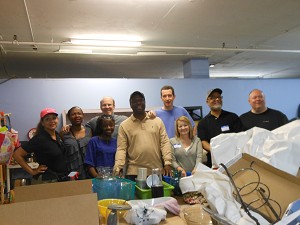Archive for the ‘Entertainment’ Category
Tuesday, June 21st, 2016
By Dennis Powell, e-Management

Is Big Data is another way of saying predatory online marketing? You decide.
Big data as the name suggests is all about large volumes of information. More and more schools, government agencies, retailers, and other organizations are analyzing big data to learn more about people. Big data players include Amazon, Facebook, and Google, to name a few. Naturally, consumer profiling by these and other companies has led many to be a little concerned about issues around privacy and has left other consumers frustrated because of what they see as predatory online marketing. Think about those ads that follow consumers everywhere online following an innocent search on Google or Bing. Yeah, that’s big data analytics at work. But is Big Data bad or good? We’ll let you decide…
The Potentially Bad Stuff…
-
Exclusion Based on Highly Sensitive Data: In a 2016 U.S. Federal Trade Commission (FTC) report (Big Data: A Tool for Inclusion or Exclusion?), the federal agency examines big data and fairness. The report raises concerns that companies may be making decisions by “incorporating errors and biases” into big data analytics. Such decisions, according to the report, could result in “potential discriminatory harms.” One example given is how analytics from social media “likes” could reveal sensitive information about consumers’ political affiliation, faith, and recreational habits (e.g. smoking, drinking, etc.). Sensitive information taken out of context could lead to excluding consumers from employment opportunities, services, and products.
-
Bad Guys Trying to Dupe Seniors (and Others) into Making Poor Decisions: Big data can be used by individuals and companies looking to scam consumers as well. The same FTC report gives examples of companies obtaining lists from people who respond to sweepstakes or ailing seniors. Apparently, these consumers may be the most susceptible to being victims of fraud.
-
Low-Income Consumers Getting Bad Deals: A Huffington Post article from Nathan Newman explains how big data can harm low-income shoppers. The article points to “free services” that come with the high-price of giving away personal information so that companies that use big data can “exploit” consumers. Examples of this is when finance companies single out low-income consumers by using targeted ads made possible by big data and then markets high-interest rate services such as payday and subprime loans to the audience. Big data obtained from free services and mobile apps can also lead to “price discrimination” where some consumers pay more for the exact same service. Well, that’s definitely not good.
The Potentially Good Stuff…
-
Better Products: Many companies are investing more and more marketing dollars to track what people say and do online—collecting information about what consumers like, dislike, and need. Data collected help companies launch new versions of cool stuff. People who get excited about the latest Samsung or Apple update can probably thank big data analytics for those innovations and new features like a smartphone that keeps working even after you drop it in water. What took them so long to get that one to market? *smiles*
-
Better Service: People do business with people they like. Big data helps companies, schools, and other organizations to tailor a better and arguably more personal experience. Writer Larry Alton points to the fact that organizations that leverage big data get their information from surveys, social media, and other online reactions to offer the best service based on your particular pet-peeves and preferences.
-
Better Deals & Decisions: Many consumers also benefit from websites and apps that use big data to pull together useful information. Think comparison shopping. For instance, couples who are planning to marry get a better idea of costs from a that estimates expenses of weddings. Many motorists cringe when there are signs of auto mechanical issues. Well, there are places to get accurate information on how much drivers should be paying for auto repairs. There’s Nextag® that gives shoppers the power to get the best deal on millions, that’s right millions of products. These convenient tools are all powered by big data analytics.
Your Thoughts…
Like any promising technology, big data analytics can be used to enhance customer experience or exploit vulnerable people. We’d love to hear from you: (1) What are your thoughts on big data? (2) How much information are you willing to give up to improve your customer experience or bring new products to market? (3) Where does your privacy fit into the big data conversation?
Tags: , analytics, Android, , apps, big data, Bing, Dennis Powell, , FTC, , HTC, iPhone, Motorola, Ola Sage, Samsung
Posted in Corporate, Entertainment, Information Security, Internet/Intranet, News | 18 Comments »
Monday, October 19th, 2015
by Dennis Powell, e-Management

Are you more focused on your online or social media world than your in-person communications and interactions? (Photo Credit: blog.doctoroz.com)
Let’s keep it real. Many of us are addicted to e-mail, social media, and all things Internet. If you think you are not obsessed with online technology, think about what life would be like if wireless networks went down and you had to live without your tablets (iPad, Google, Windows, Samsung, etc.) or mobile phones (Android, Blackberry, iPhone, etc.) for a few days. *add horror show music here* 
Sure Internet-enabled technology has its benefits, including quick access to family members, lower cost for long distance communications; portable music, literature, and movies; and instant access to information about virtually any topic. Nevertheless, there are drawbacks. The online world may lead some of us to experience feelings of depression or anxiety. Then there is the fact that everything on the Internet is essentially traceable—leaving users vulnerable to online spies, con artists, or predators.
Tips to Unplug from the Internet, Apps, Games, or Social Media
The capacity for others to see our most intimate online communications is a little too “Big Brother” for my taste. Add to that, online communications can be extremely demanding on your time. So, I got to thinking. Are there ways people can unplug to become better connected to old fashion human interaction? Are they tricks to protect users from Internet surveillance or online predators? So I pulled together this short tip list.
-
Try logging off for a weekend: Personally, Monday through Friday is the time I am most connected via mobile phone, text messaging, social media, and the Internet for work and personal use. During the weekends, I have essentially put in place an online moratorium. As a result, my weekends are free from various Internet interruptions and I can spend time with people who are dearest to me. In addition, I discourage the use of tech devices with the exception of the occasional camera phone when I am with my family and friends.
-
Try blocking off time away from the Internet, online games, and mobile devices: Think about it, many parents limit their children’s access to television as a way to provide balance in their kids’ lives. Try using the same concept when it comes to your mobile devices and online communications (texting, social media, games, apps). If a weekend is too long for you to be offline, consider establishing a weekly or bi-monthly family and friend’s night out. Turn off the phones and Internet devices and keep them in “airplane” mode so that you are disconnected from the web, and can now focus on meaningful connections with loved ones.
-
Learn how to protect your online privacy: ZDNet, an online tech resource, offered up several lines of protection from online spies including getting rid of social media altogether, turning off all GPS-tracking apps, and quit texting. These recommendations may seem draconian; but these simply activities will reduce how much private information you place on the Internet, making you less vulnerable to spies and hackers.
-
Create a plan to limit one’s time online: A recent study by Anxiety UK, revealed more than 50% of people surveyed by the organization said they saw their lives change negatively with their increasing online interactions. As it turns out, too much online interaction may lead to online fights; may promote the perception that the user is less capable, attractive, or appealing than others online; and may lead to forms of anxiety. These are compelling reason to limit one’s online time. Try blocking off time for online communications and setting an alarm, which notifies you of when it’s time to “unplug.”
All about Balance
It’s kind of scary when you think about how connected we are to Internet-enabled communications and the impact it can have on our emotions and our very existence. Still, online communication is clearly an enjoyable experience for many of us. So, (1) What tips do you have to maintain a healthy online/offline balance? (2) Does online communication make us more social or anti-social? (3) What are some of the things about mobile devices and their users that drive you crazy?
Tags: Android, , apps, Dennis Powell, , gaming, , iPad, iPhone, Nokia, Ola Sage, Samsung, smartphone, Social Media, tablet, unplugging
Posted in Entertainment, Family, Social Media | 19 Comments »
Thursday, September 10th, 2015
By Dennis Powell, e-Management

Autumn can be a spectacular. It can also be a stressful time for many professionals, parents, and families. (Photo Source: Wikimedia Commons)
September is here, which means meteorological summer will soon be but a distant memory. Autumn can be a stressful time for many professionals, parents, and families. Why? Students and workers are returning from summer break and vacations all at once, adding volume to traffic and increasing gridlock throughout various communities across the country. Plus, work life for many go from zero to 100, making professional life busier and often more hectic. *take a deep breath* Well, the e-Management blogging team sympathizes and has pulled together a short list of how to deal with all of the headaches, anxiety, and stress that are often associated with the beginning of Autumn and the back to school season.
-
Eat well, stay active, and get plenty of water: Whether you are a student, parent, or professional, maintaining optimal health through a healthy diet and regular exercise is a great way to deal with autumnal stress. Nutritionist Michelle Stewart, MPH, RDLD/N, CDE, confirms that dehydration can make the body work extra hard when dealing with stress. In addition to drinking ample amounts of water as a way to lower stress levels, she recommends making “wise food choices” by consuming less high saturated fat foods and more whole (non-processed) foods like vegetables, grains, and fruits. Finally, fitness experts agree exercising including Zumba, swimming, cycling, jogging, yoga, and weight training is an effective tool for reducing the effects of stress.
-
Keep the lines of communication open: For parents of anxious students who are starting classes or a new school, Elizabeth Scott, stress management expert and author of the , recommends parents talk and listen to their children’s anxiety around starting or returning to school. She advises that parents take the time to understand what their daughters’ and sons’ misgivings are around a new school year. Scott also suggests this may be a great time to talk about potential “bullies” and peer pressure. Essentially, she asserts that keeping the lines of communications open for your children can go a long way in their success.
-
Prepare for the next day, the night before: For folks who are returning to work from vacation or employees preparing for a busy season at their jobs, planning may be the thing to relieve workplace related stress and anxiety. Jason Mannino, career coach and executive recruitment program manager at University of California (UC) Berkeley, recommends getting your clothing ready every evening. This simple act can actually reduce morning stress, which can carry over into the workplace. Mannino also recommends going to bed early and offers up tips for improving sleep, such as making the bedtime process an hour of unwinding down. Experts confirm benefits of sleep to include improved academic performance, fewer accidents, and yes less stress.
-
Talk to yourself. It’s not necessarily a sign of mania. Instead, it can be a helpful tool in managing stress. The American Heart Association recommends highly stressed people incorporate “positive self-talk” into their daily routines. When faced with stressful situations, positive self-talk phrases like, “I’ve got this” or “Someday I’ll laugh about this” can control stress levels.
-
Consider getting professional counseling: The National Institute for Occupational Safety and Health (NIOSH) reports in the that two out of every five employees say their job is “very” or “extremely stressful.” A survey from the American Psychological Association warns that young students who cope badly with stress may carry those ineffective habits into adulthood. It is important for youth and adults to find healthy ways of coping with stress and anxiety. Naturally, students and adults who are overwhelmed by life’s stress and anxiety levels should seek support from certified counselors or experts in stress management. Check out WebMD’s Anxiety & Panic Disorders Health Center for resources to assist in finding counsellors.
What do you think?
Hopefully, those tips were useful. Still, there are certainly more ways to reduce stress. So, we want to hear from you. (1) Does Autumn bring about more or less stress for you, your coworkers, or your family? (2) How to deal with school, home, or workplace stress?
Tags: anxiety, autumn, Dennis Powell, , fall, Family, NIOSH, Ola Sage, parents, seasons, stress management, students
Posted in Entertainment, Family, Lifestyle | 21 Comments »
Tuesday, August 11th, 2015
By Dennis Powell, e-Management

e-Management supports A Wider Circle, a charity focused on eliminating poverty. What are your favorite causes or charities? #mypriority #AWiderCircle
Charitable giving which includes financial support, in-kind donations, and volunteering can be one of the most fulfilling things anyone can do. Yet, there are actually some charities that take advantage of the public’s generosity. How are a few nonprofits getting over on donors? Well, CNN reported that the “nation’s 50 worst charities” wastefully paid fundraising companies almost $1 billion during a 10-year span. Even more concerning, these same 50 charities gave “less than 4% of donations raised to direct cash aid.” In other words, if I give $100 to my favorite cause, only four dollars go to programs that support real action.
So, how can consumers find charities that focus on maximizing donations for people and causes rather than consultants and executives? e-Management has gathered a few tips that may help anyone who is thinking about giving to charities…
-
Confirm that the charity is real. The Charity Navigator—a nonprofit with the mission to help empower people to give intelligently—recommends donors confirm the 501(c) (3) status of charities prior to committing any dollar to a cause. In the United States, 501(c) (3) organizations are tax-exempt nonprofits that meet special requirements under Section 501(c) of the United States Internal Revenue Code (26 U.S.C. § 501(c)). Donations to these organizations are tax-deductible. According to the Charities Review Council, consumers may also be able to deduct expenses incurred while volunteering at these nonprofits as well as get a deduction on some of the cost of attending a charity event sponsored by 501(c) (3) organizations.
-
Request an annual report. Not all 501(c) (3) organizations are run efficiently to maximize dollars that support their causes. CNN exposed a Florida based charity that raises millions of dollars every year, yet it spent “less than 3 cents on the dollar helping kids.” In contrast, e-Management works with , a 501(c) (3) with only 2% overhead (operational expenses) and the charity is committed to using fundraising dollars to directly “serve those in poverty.” Clearly, A Wider Circle is putting its donations toward advancing its mission! Donors can get financial information about charities by requesting an annual report or a statement of activities. An annual report gives donors insight into how a nonprofit uses its resources and oftentimes showcases the successes of their programs. Some annual reports will even explicitly list top donors, which may offer additional peace of mind for donors.
-
Build a relationship with your charity. Charities are living organizations that may experience highs and lows. Many nonprofits rely heavily on private donations. Once a charity has been qualified as a 501(c) (3) that provides services to advance its mission, consumers may want to consider setting up automatic and periodic donations (e.g., monthly, annual) to their trusted charity. Donors may even consider volunteering a few hours every week or month. Another option for donors is to find out how they can become social media advocates to help their cause secure additional supporters, volunteers, and donors. Supporters of charities may also want to attend annual fundraising events and invite their family and friends to buy tickets. Seasoned leaders, managers, directors, or executives may want to consider joining planning committees or boards of advisors/directors of their favorite charities to ensure of the organizations’ long-term success.
-
Learn about new charity scams. It seems as if every day there is a new online or telemarketing charity scam that targets people who want to make the world a better place. The good news is that the Federal Trade Commission (FTC), the consumer protection agency, makes identifying such scams easy. Donors can visit the FTC website, which gives consumers a Charity Checklist to help them avoid costly scams. Click for more information. It’s that simple!
What charities or causes are right for you?
Forbes magazine ranks the in the countries based on private support and other criteria. The on the list are United Way, Salvation Army, and Feeding America. (1) Did your favorite charity make it on the Forbes list? (2) What are your favorite causes? (3) What do you look for in an organization when you donate?
Tags: #mypriority, A Wider Circle, cause, charity, CNN, Dennis Powell, , , Forbes, fundraising, nonprofit, Ola Sage, Salvation Army, United Way
Posted in Entertainment, Family, Lifestyle, Social Media | 22 Comments »
Tuesday, June 9th, 2015
By Dennis Powell, e-Management

Did you know a trip by Amtrak results in less greenhouse gas emissions than other popular modes of travel? (Photo: Amtrak)
The National Railroad Passenger Corporation, known as Amtrak, is a quasi-government organization that officially launched 44 years ago. Amtrak provides passenger train service to nearly 31 million passengers to towns and cities across the country. Since 1971, Amtrak has relied on federal money—much to the chagrin of some members of Congress, which authorizes the passenger railroad service’s funding. Amtrak has also faced significant challenges. The Federal Railroad Administration (FRA) data shows that between 2010 and 2014, there has been an average of 26 derailments annually. So far, this year there has been at least nine. Amtrak’s May 12th derailment in Philadelphia left over a half dozen dead and more than 140 injured. The accident renewed criticism around the organization’s safety and funding. Others have criticized the passenger rail service for what they see as old-fashioned technology, which lags behind the United Kingdom, France, Japan, and China.
Enough of the criticism!
With all the negative press and unfortunate events around Amtrak over the past few weeks, it’s sometimes too hard to remember that there are benefits and conveniences to using the rail service. We’ve pulled together a list of why Amtrak is important to life in America.
-
Amtrak drops passengers and business travelers off in the actual city they are visiting. First time visitors to Washington, DC—a popular Amtrak destination—are usually surprised at the hurdles they may have to go through to get from Dulles International Airport to the city, which is located about 27 miles away (up to an hour of driving if there is traffic). In contrast, Amtrak passengers are dropped off at Union Station, only a few blocks from Congress, eateries, hotels, historical sites, and downtown DC. The same is true for rail stations in New York City, Philadelphia, and other towns serviced by Amtrak. Say goodbye to those $75 taxi rides to the hotel and those sometimes frustrating multiple stops via shuttle service providers!
-
Amtrak’s travel experience is often less of a hassle…Passengers get more leg room than the typical premium, extra cost seats on airlines AND they don’t have to pay extra! Plus, travelers won’t be stuck in the dreaded middle seat because there aren’t any on Amtrak. Customers can power up their smartphones, tablets, or laptops using power outlets on trains. There is also free Wi-Fi on some trains. What about those popular $50 luggage fees and other hidden costs associated with some airlines? Well, the Amtrak website states there are “no extra fees—what you see is what you get.” Perhaps best of all, passengers aren’t required to show up two hours before the train leaves, wait in long security lines, or undress (removing shoes, belts, etc.) before jumping abroad. For city to city/regional travel, Amtrak seems like a more streamlined approach to traveling.
-
Traveling by Amtrak is greener than air travel or a road trip. That’s right. A trip by rail results in less greenhouse gas emissions than other popular modes of travel! The U.S. Department of Energy Oak Ridge National Laboratory Data on Fuel Efficiency – Transportation Energy Data Book (Edition 33) illustrates that traveling by rail is 30% more efficient (in terms of mileage) than by auto. Amtrak is so committed to reducing its passengers’ carbon footprint, it has partnered with Carbonfund.org. This partnership empowers Amtrak riders to offset their “carbon emissions footprint” through making voluntary contributions to Carbonfund.org—a nonprofit dedicated to reducing the environmental impact of energy consumption. Find out more at
-
Amtrak puts Americans to work. The rail service employs more than 20,000 people. As one might expect, Amtrak staff and loved ones can take advantage of complimentary services on the rail systems traveling throughout its 21,300-mile (34,000 km) system. Amtrak employees don’t pay Social Security taxes. Instead, they get a higher retirement benefit by paying special taxes as a result of the Railroad Retirement Tax Act (RRTA). Plus, they can elect to participate in a traditional 401(k) retirement plan.
Not Even Close to Perfect
Amtrak isn’t the most advanced passenger rail system in the world. Its federal funding will likely be cut again in the next fiscal year. And yes, it has yet to turn a profit. Still, with proper guidance, investments, and upgrades to its infrastructure, Amtrak’s future days could be brighter. (1) What are your thoughts of rail vs. road vs. air travel? (2) Do you think Amtrak is good for America? (3) When was the last time you traveled by rail (excluding light rail and subway systems)?
Tags: Amtrak, carbon emissions, Dennis Powell, , FRA, government spotlight, greenhouse gas, hi-speed rail, Ola Sage, rail
Posted in Entertainment, Government, Lifestyle, Travel | 26 Comments »
|
|








